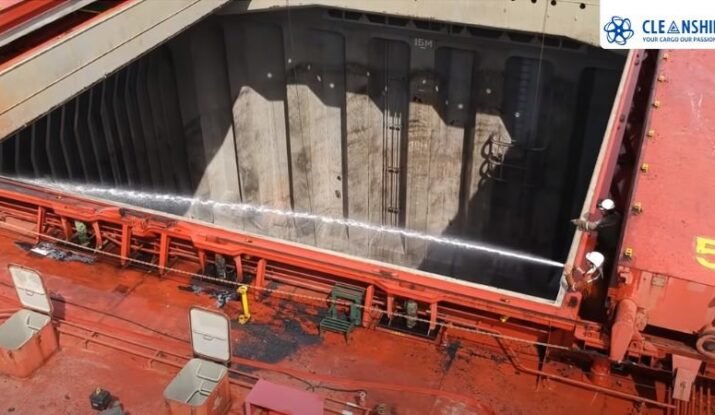The purpose of hold cleaning in maritime operations is multifaceted and important for ensuring the safety, efficiency, and regulatory compliance of cargo transportation.
Mostly, hold cleaning aims to remove ruins, contaminants, and waste from cargo holds after each shipment. This process controls cross-contamination between different types of cargo, preserving the integrity and quality of goods during transit.
Additionally, clean holds contribute to maintaining the structural integrity of vessels by preventing corrosion and damage, thereby extending their operational lifespan. From a regulatory standpoint, clean cargo holds are necessary for compliance with international and local cleanliness standards, which are enforced to prevent the spread of pests, diseases, and pollutants across borders.
Purpose of Hold Cleaning
Cargo hold cleaning offers several advantages that contribute to efficient maritime operations and cargo management:
1. Ensures Cargo Integrity and Safety
The main purpose of hold cleaning is to safeguard cargo goodness during transit. By simply removing residues, contaminants, and waste from previous loads, hold cleaning prevents cross-contamination and ensures that the new cargo arrives at its destination in optimal condition.
This process is especially required for sensitive cargoes such as food products, chemicals, and pharmaceuticals, where contamination can lead to significant financial losses and safety risks.
2. Maintains Vessel Structural Integrity
Regular hold cleaning helps maintain the structural goodness of the vessel itself. Residues left unchecked can lead to corrosion, weakening the hull and compromising its seaworthiness. By cleaning cargo holds regularly, ship owners and operators mitigate the risk of structural damage and extend the lifespan of their vessels.
3. Facilitates Regulatory Compliance
Hold cleaning is necessary for compliance with international and local regulations governing maritime transport. Authorities set strict cleanliness standards to prevent the spread of pests, diseases, and pollutants across borders. Vessels must undergo inspections to verify compliance with these regulations, and clean cargo holds are a fundamental requirement for obtaining clearance to load or unload cargo at ports worldwide.
4. Improves Operational Efficiency
Efficient hold cleaning practices miscalculate turnaround times at ports. Clean holds reduce the risk of delays due to quarantine or inspection issues, ensuring that vessels can quickly unload and load cargo. This efficiency is important for maintaining tight shipping schedules and meeting customer demands, thereby enhancing overall operational productivity.
Advantages of Hold Cleaning
While hold cleaning offers numerous benefits, it also comes with different advantages:
1. Enhanced Cargo Quality
Clean cargo holds contribute to maintaining the quality and market value of transported goods. Customers receiving uncontaminated cargo are more likely to trust the shipping company, fostering long-term business relationships and customer satisfaction.
2. Cost Savings
Investing in regular hold cleaning can lead to cost savings in the long run. Preventing corrosion and structural damage through aggressive maintenance reduces the need for costly repairs and extends the operational life of the vessel. Additionally, avoiding delays and fines associated with non-compliance can result in significant financial savings for shipowners.
3. Environmental Protection
Clean cargo holds minimize the risk of accidental spills or leaks of pollutants into marine environments. By adhering to cleanliness standards and using eco-friendly cleaning products, shipping companies demonstrate their commitment to environmental stewardship and sustainable practices.
4. Crew Safety
Maintaining clean cargo holds enhances onboard safety for crew members. A clean working environment reduces the risk of slips, trips, and exposure to unsafe substances, promoting a healthier and more productive workforce.
Disadvantages of Hold Cleaning
Despite its benefits, hold cleaning also presents some challenges and potential disadvantages:
1. Time and Labor Intensive
Cleaning large cargo holds requires significant time and labor resources. Depending on the size of the vessel and the nature of the cargo residues, the cleaning process can be time-consuming and physically demanding for crew members.
2. Chemical Exposure
The use of cleaning agents and chemicals poses potential health risks to personnel involved in hold cleaning operations. Proper training and safety protocols are essential to minimize disclosure and ensure the safe handling of cleaning products.
3. Operational Disruptions
Scheduled hold cleaning can disrupt vessel operations and logistics planning. Shipowners must carefully schedule cleaning activities to minimize downtime and avoid conflicts with loading and unloading schedules at ports.
4. Cost Considerations
Investing in equipment, cleaning products, and trained personnel for hold cleaning incurs additional operational costs for shipping companies. While these costs are necessary for maintaining compliance and operational efficiency, they can impact profit margins, particularly in competitive shipping markets.
Read Also: Why Prioritize Cargo Hold Cleaning in Bulk Carriers?
Conclusion
Hold cleaning plays an essential role in maintaining maritime safety, cargo integrity, and regulatory adherence. While it requires investment in time, resources, and adherence to safety standards, the benefits outweigh the challenges.
By prioritizing regular and thorough hold cleaning practices, shipping companies can enhance operational efficiency, protect the environment, ensure crew safety, and uphold their reputation in the global shipping industry.
FAQs:
1. What is the basic rule of cleaning?
The basic rule of cleaning is to remove dirt, contaminants and ruins effectively to accomplish a clean and sanitized environment.
2. What is the highest standard of hold cleaning?
Hospital clean is the most elevated cleanliness level and is usually only met by ships exclusively trading specific cargoes, with it rarely being seen in the tramp trades. Grain clean is the most common of conditions, particularly if the ship has not been fixed for the next cargo.

